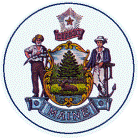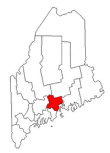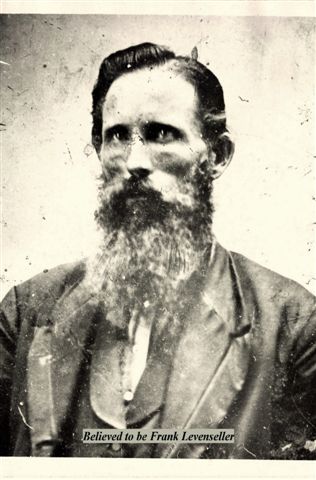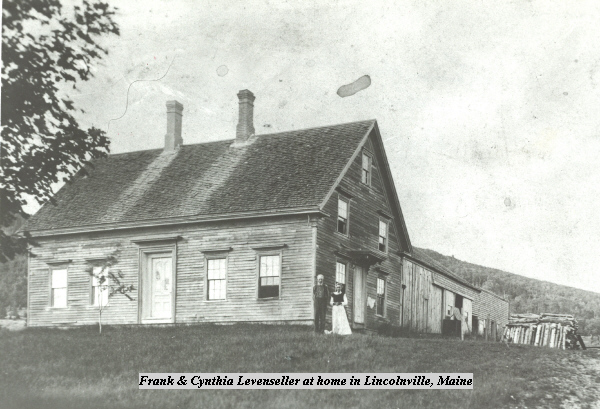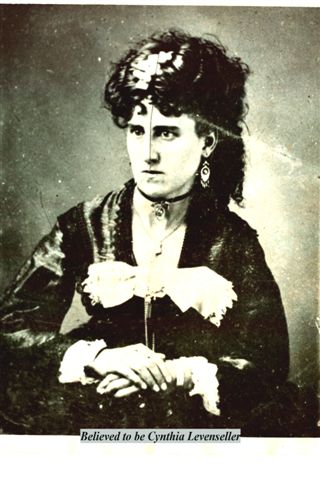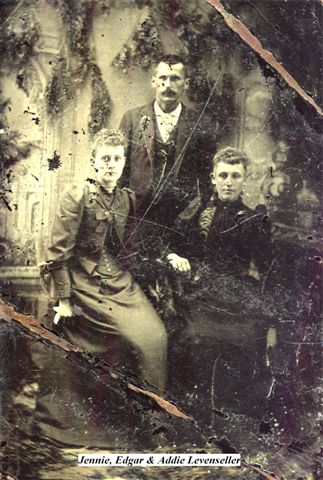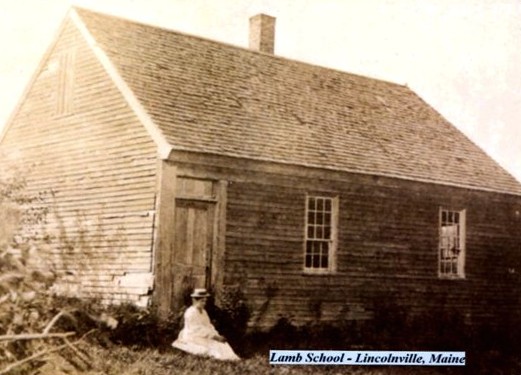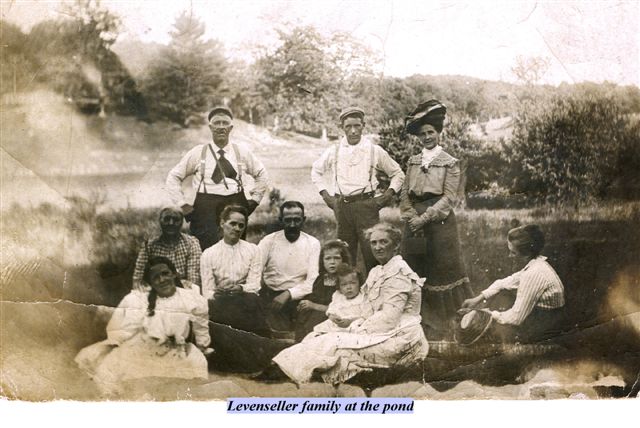A life of
community service
Frank dozed in his chair. He thought that he
heard an approaching buggy, but it passed
down the lower road. Frank sat in his
rocking chair in the living room of the
house where he had been born.
His faithful wife of 37
years, Cynthia, had recently passed away.
He’d written to Ed, his younger son who
lived with his family on the West Coast,
asking him to come home. All that Frank
owned in the world, he wanted to give to his
son, Ed, including the family farm.
The early
summer sun streamed through the window,
shining on Frank’s face, feeling very good
after a few weeks of not knowing which way
his life was going. He felt so tired. With
Cynthia’s passing, Addie had moved into the
house. He just didn’t feel well anymore, and
even was getting a little paranoid.
Frank and Cynthia had lived a
good life on the farm at the base of the
mountain across from the pond which bore his
family name.
Frank’s
grandfather, Jacob Levenseller had come to
the wilderness called Canaan in the early
days of the settlement of the town of
Lincolnville. Grandfather had carved out a
farm from the 125 acres of wooded land,
cutting the wood and brush and hauling the
rocks from the rough terrain to build the
formidable stone walls, which served as
boundaries and fences.
Grandfather had built his log
cabin farther up on the side of the
mountain. The stone foundation was still
visible in the upper field.
Frank’s
father, Hezekiah, along with his siblings,
were born in the old cabin. Hezekiah had
married Margaret, known to all as Peggy,
daughter of Samuel Dean. There, they raised
their family on the side of the mountain. It
was Frank’s father who built the long set of
farm buildings on the bank across the road
from the pond. The buildings consisted of
the big farm house with shed connected,
running uphill, with the large barn.
As Frank
dozed in the sun, his whole life seemed to
be running through his mind, as clear as
though it had happened yesterday. He
remembered his brother, Sam, who had gone to
fight in the Civil War. Sam had been the
second brother of that name. Their mother,
Peggy, had told him of her first-born son,
Samuel Dean Levenseller, named after her
father. Frank had kept up the family burial
plot with the little white stone with
Samuel’s name, in the cemetery in Centre
Lincolnville.
The second
Sam had married Eunice French, having two
children, Clary and Sam Jr. before he
answered the call for volunteers to fight
for the Union, on Feb. 22, 1864. Sam was two
years younger than Frank. Just six months
after he left, their father received the
letter that Sam had been killed in action in
an ambush on the railroad, Aug. 25 at Ream’s
Station, Va. Father and Mother took the loss
hard. Frank still felt the emptiness of
losing a brother.
Frank was 28
when he married Jane Luce of Searsmont. She
bore him a son, John Wesley Levenseller, in
1870. Jennie, as she was called, died when
John was 2 years old, of complications of
delivering a premature babe. Jennie was only
29 years of age. Frank’s mother was too old
to care for a youngster, so John was mostly
raised by his mother’s family in Searsmont.
Frank saw him as often as he could.
After
Jennie’s death, Frank courted her double
cousin, Cynthia Maria Luce. Jennie and
Cynthia’s mothers were sisters of the
Wentworth clan, and their fathers were
brothers, James and Elijah Luce. Cynthia was
‘in a family way’ when they married in 1873.
Addie was born six and a half months later,
followed by Edgar in 1875 and baby Jennie in
1877.
Cynthia had
been a good, faithful and loving wife. They
had been married 37 years, living on the
farm with his parents, Hezekiah and
Margaret. Father had died in 1879, six years
after Cynthia had come to live in the
household. Mother died in 1886, at the
advanced age of 87 years. Mother was known
as a kind and thoughtful neighbor to all.
Mother and Cynthia got along fine in the big
old farmhouse. Father and Mother were born,
died and had always lived in the town of
Lincolnville.
Frank was a
very smart, self-educated man. He recalled
the hay press he had put together. It had
seemed to him that when he and the other
farmers had extra hay in their barns, the
hay took up much less space and easier to
handle if it were compressed.
Several men
came by to look over his invention. Then one
day in 1876, he read in the local newspaper
a notice reading, “HAY PRESSES! CAUTION! I
hereby notify all persons that are building
or intending to build or operate said
presses without the sanction of Ambrose
Strout, that they will be prosecuted, and
compelled to recognize his right in the
invention…” and a second notice that A.
Strout claimed all territory in the U. S.,
New Brunswick or unsold territory, for his
presses, and anyone pressing hay in his
territory could settle the trespass with
Strout’s lawyer.
Frank put his
hay press into the shed, locked the door and
left the press for a few years. In 1891, he
was again pressing hay for the neighbors. He
was also raising crops, especially potatoes,
to ship to the Boston markets.
Frank
recalled the evening in 1895 when his
youngest daughter, Jennie, came to him with
her beau, John Morse, asking for his
permission and blessing to be married.
Jennie was 17 years old and 'in a family
way.’ Frank admonished John, asking if he
realized the responsibility that he was
taking on, as he paced the living room with
his hands behind his back. He then gave them
permission to marry, telling John to take
good care of his daughter.
The Lermond
children, living next door, spent carefree
days between chores and school, with Jennie,
Addie and Ed, swimming in Thomas Pond,
having picnics, playing childhood games, and
enjoying each others’ company. They all
attended the Lamb School down the road where
Frank often taught.
Frank’s roots
were German. His father told him of his
people who had come to Old Broad Bay, later
known as Waldoboro, from Germany in the mid
1700s. Frank had many relatives in the
Waldoboro area. Grandfather had told him
that when they came to the new settlement of
Canaan, later called Lincolnville, they saw
the twin mountains in the distance.
Grandfather said, “That’s where we will
settle,” and so they did.
Katie Lermond
had married Sylvanus Griffin. They, Ed and
some of the Lermond boys went to
Massachusetts to make their fortunes. The
Lermond children’s mother, Mary, who had
been born in Ireland, had family in
Massachusetts. Ed had gone to Boston to work
about the time that Jennie married. Frank
took him to Rockland, when he took a load of
potatoes to be shipped on a steamer of the
Eastern Steamship Company. He’d gotten $1 a
bushel for the potatoes, a good price. Ed
took the steamer to Boston.
Frank’s
children seemed to be doing very well for
themselves. John had a sawmill in Searsmont,
where he sawed long lumber, as well as
staves and barrel heads for the coopering
business. John was an active member of the
Masonic Lodge. He had married in 1906 to
Julia Berry. They had two daughters,
Margaret and Marjorie.
Frank had
given Jennie a teaching job in Lincolnville
during the early days of her marriage
between the births of her children. Jennie
soon gave up teaching to tend to her family.
A tear ran down Frank’s cheek, as he
recalled one of the saddest days of his
life.
He and
Cynthia had gotten word from John Morse that
Jennie was having a very difficult delivery
of her eighth child. He harnessed up the
buggy horse, hitched him to the wagon and
drove over to Belmont, getting there just
before Jennie passed away, leaving a
motherless premature infant son and seven
young children.
Jennie was
their beautiful baby daughter. Cynthia was
grief-stricken. Frank didn’t think she ever
got over Jennie’s death. It had been more
than three years, and his eyes and heart
still welled up with the sadness of seeing
her grieving family. Her children were so
young that they had no idea of what was
going on. Jennie was only 30 years old. It
brought back memories of the death of his
first wife, Jennie. He often drove to East
Searsmont to young Jennie’s grave. The first
Jennie was buried in Appleton Village with
her people, so he didn’t get there often.
Now Cynthia was gone. Oh, Cynthia, you, too,
were too young to leave this earth, only 59
years old.
Frank had
been a school teacher since he was in his
early 20s. He taught more than 50 years, and
was superintendent of schools in
Lincolnville. In 1877 and 1878 he also
served as selectman of Lincolnville. He had
been known as a strict school teacher. There
was so much to teach young ones, if they
were willing to learn. He recalled meeting
Alice Pitcher years after he’d taught her.
Alice attributed her success in teaching to
him. She told him, “When you taught a
lesson, we understood and learned it!”
Frank always
had a work horse or two on the farm. He also
enjoyed his fine younger horses, used with
the riding buggy. He and his neighbors,
George Lermond and Lucius Knight, enjoyed
trotting their young horses in friendly
competition to see whose horse could do the
best. In the winter, they competed on the
frozen pond. Observers said the colts were
all about equal.
Hark! Did he
hear children’s voices? It had been some
time since the old house had the laughter
and chatter of children. Ed, his wife and
three children had arrived, in answer to the
letter that Frank had written him.
Frank wanted Ed and his family to live on the
farm, and to keep it in the Levenseller name.
Ed had come all the way across country from
Washington state with his household goods.
Frank was not thinking well at all these days.
Ed and family stayed two weeks, then left,
telling Frank they were returning west. Frank
never quite understood why Edgar didn’t stay.
He never saw his son again. Addie, who had
married Hud Elms, was living on the farm now.
Francis
Hezekiah Levenseller, always known as Frank
and F.H., died June 26, 1911, just one year
after Cynthia had passed away, and four
years after the death of his beloved
daughter, Jennie. Frank was 74 years old. He
died on the farm where he, and his father
before him had been born.
His obituary
recorded that he was a man of sterling
qualities and his dealings with his
fellowmen were honest and upright. His
kindness of heart and nobility of character
won for him many friends. It can truly be
said a good man has gone from our midst.
A verse from
his obituary reads: “One less at home! The
charmed circle broken — a dear face Missed
day by day from it usual place, But
cleansed, saved, perfected by Grace, One
more in Heaven!”
He joined
Cynthia, there, whose obituary recorded:
“Although our loss is her gain and she can
never return to us. We feel that we shall
one day go to her where there is no more
parting!”
written by
|

